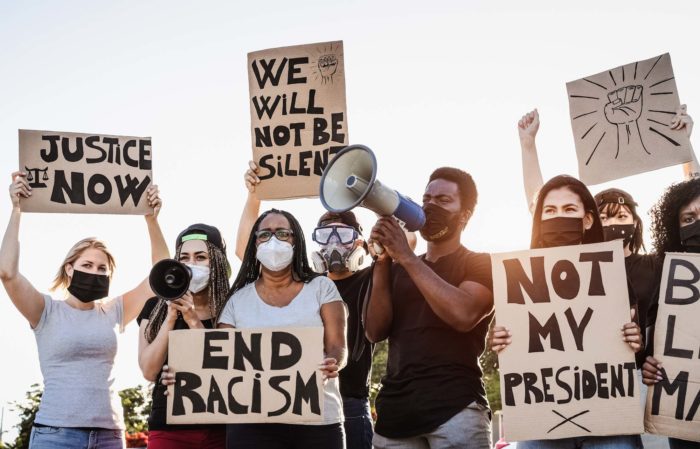Top Class Actions’s website and social media posts use affiliate links. If you make a purchase using such links, we may receive a commission, but it will not result in any additional charges to you. Please review our Affiliate Link Disclosure for more information.
The American Civil Liberties Union of Iowa has filed a federal lawsuit on behalf of five Des Moines racial justice protesters who it alleges were unlawfully arrested and banned from entering state Capitol grounds following an altercation between Black Lives Matter supporters and law enforcement during a July 1 protest.
Calling the police actions a “stunning misuse of power,” ACLU lawyers argue that banning the plaintiffs from the Iowa Capitol Complex for up to a year is unconstitutional as it blocks their rights to free speech, assembly, freedom of movement, and their rights to petition the government for redress of grievances.
The bans also violate plaintiffs’ due process by failing to provide sufficient notice and an opportunity to be heard to contest the bans, lawyers argue.
The 24-page racial justice lawsuit was filed Monday by the ACLU of Iowa on behalf of five plaintiffs who have been active this spring and summer with the Des Moines Black Liberation Movement, a part of the national Black Lives Matter movement. They are Des Moines BLM organizer Jalesha Johnson, a student at Drake University; Louise Bequeaith, a college student; Brandi Ramus, a hairstylist; Brad Penna, owner of a local coffee shop; and Haley Jo Dikkers, an educational assistant.
Defendants in the racial justice lawsuit are Commissioner Stephan K. Bayens, Commissioner of the Iowa Department of Public Safety; Lt. Steve Lawrence, Iowa State Patrol District 16 Commander; Sgt. Tyson Underwood, Assistant District 16 Commander, ISP Trooper Durk Pearston; and one other unnamed ISP Trooper.
On July 1, plaintiffs attended what began as a peaceful daytime protest organized by the Des Moines BLM. Protesters were speaking out against the state’s then-policy of barring Iowans convicted of felony offenses from voting.
The protest turned chaotic when officers from the Des Moines Police Department arrived with warrants to arrest individuals they suspected of damaging a police vehicle at a prior protest held at a local grocery store, according to the lawsuit.

Ultimately, police arrested at least 17 protesters, including the five plaintiffs, in addition to the individuals they’d sought with warrants. The plaintiffs — and others arrested — were told verbally by ISP officials that they were prohibited from entering state Capitol grounds, in some cases for six months and in other cases for a year, according to the lawsuit. In addition, the Iowa State Patrol sent some plaintiffs written notices informing them of the bans.
The letter states that entry to “any portion of the property known as 1007 East Grand Avenue, Des Moines, IA 50319 including yards, parking areas, state owned streets and sidewalks, and all state owned facilities within the Capitol Complex grounds” will be reported to law enforcement, according to the lawsuit. If found on the premises, plaintiffs would be arrested and could be subject to prosecution for criminal trespass, according to the lawsuit.
The Iowa Capitol Complex is a sprawling area that consists of 24 city blocks in downtown Des Moines and includes public sidewalks and streets in addition to government buildings, according to the lawsuit.
ACLU lawyers contend there is no statutory authority for police to enact such bans and that the bans block individuals’ rights to exercise their core First Amendment rights and freedoms.
Johnson, the Drake University student who received a one-year verbal ban from the Capitol Complex, said during a news conference Monday that “as a young person, as a Black person, as a woman, in professional spaces, our voices are not heard. We’re not asked to the table,” the Iowa State Daily reported. “The Capitol protests were a way to ensure we were at the table when these decisions were being made that impact the city we pay taxes in, we work in, we live in.”
Protests demanding an end to discrimination and police violence erupted around the country this spring following the killing of George Floyd, a Black man, while in Minneapolis police custody in late May. Video of Floyd’s death, taken by a bystander, went viral.
The Des Moines BLM group has been “a catalyst to drive important reforms” in the city and the state, according to the ACLU.
Activism by the group has contributed to recent policy changes including the adoption of a city ordinance banning racial profiling, state legislation prohibiting law enforcement from using chokeholds in many circumstances, and restoration of voting rights for felons — the goal of the July 1 protest. Iowa Gov. Kim Reynolds signed an executive order in August restoring those voting rights.
Plaintiffs are seeking declaratory and permanent injunctive relief, damages, and attorney’s fees.
Plaintiffs are represented by Rita Bettis Austen and Shefali Aurora of the ACLU of Iowa Foundation Inc.; as well as Glen S. Downey of The Law Offices of Glen S. Downey LLC and Nathan A. Mundy of Mundy Law Office PC.
The Des Moines Protesters Racial Justice Lawsuit is Jalesha Johnson, et al. v. Stephan K. Bayens, et al., Case No. 4:20-cv-00306, in the U.S. District Court for the Southern District of Iowa, Central Division.
Read About More Class Action Lawsuits & Class Action Settlements:
Instacart Class Action Lawsuit Says Company Bars PTO with FMLA Leave
Arizona School District Sues Juul over Vape Marketing















